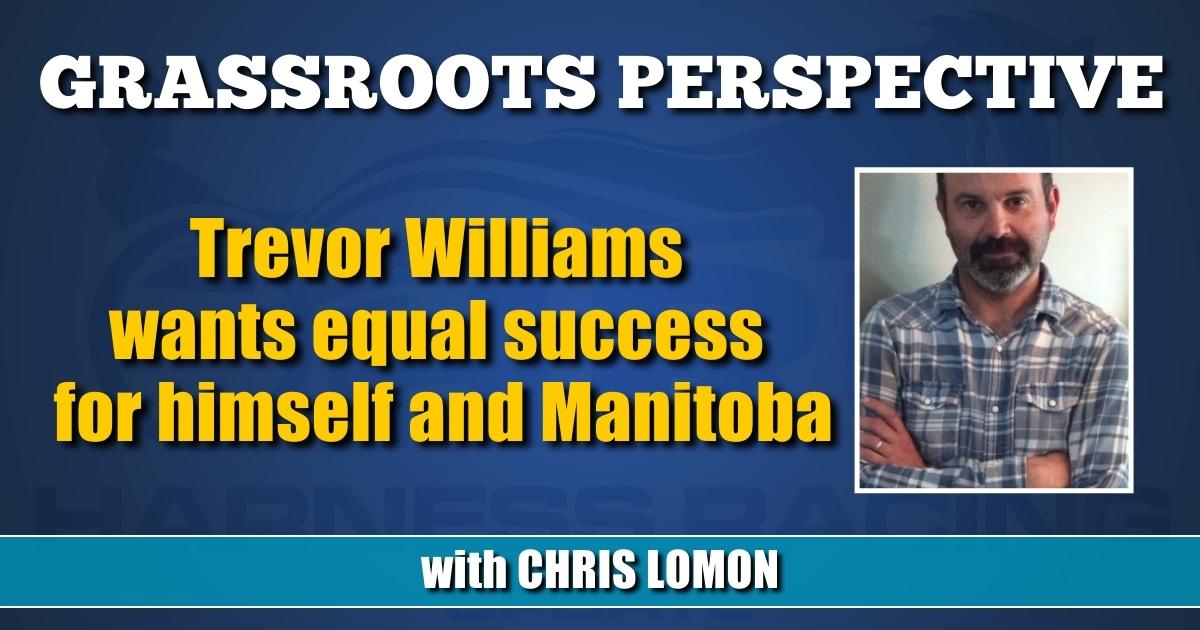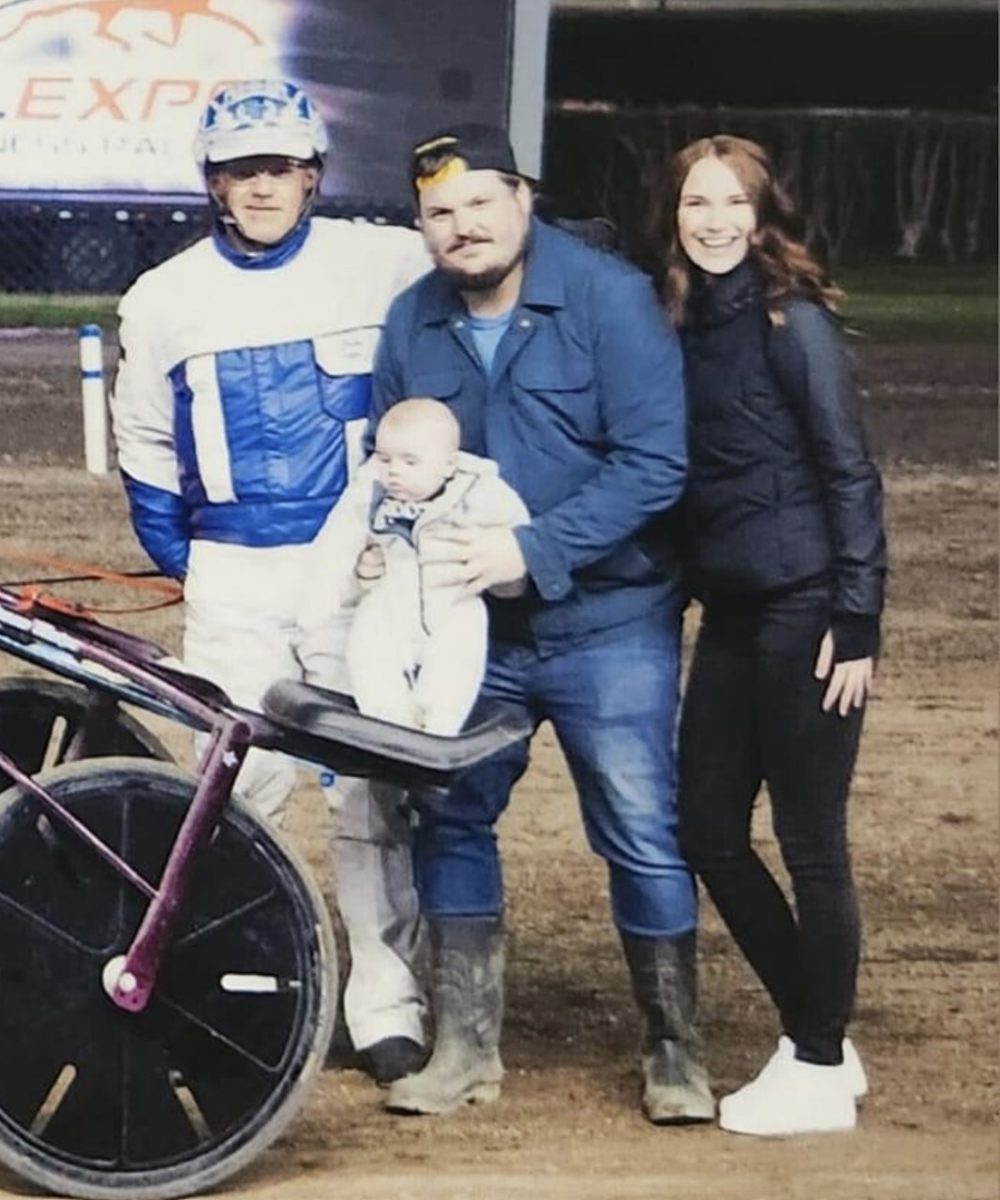Trevor Williams wants equal success for himself and Manitoba
by Chris Lomon
For Trevor Williams, success doesn’t always show up on the stat sheet.
He’s made a name for himself in his native Manitoba and beyond its borders, as a horseman whose top goal is a dead heat between personal achievement and the long-term health of standardbred racing in his province.
“Success, for me, is my personal barn’s success,” the 35-year-old Williams said. “I would like to see more wins, more money and a higher average than my previous years. Always striving for better is what keeps me wanting to do this. There is no better feeling in the world than winning a horse race, other than winning a bunch of horse races. A successful year for me would also be to secure a long-term deal with the provincial government and see the industry grow here. I really strive to make the Manitoba industry a little bit better.”
Williams, who drives, trains and owns, is also the president of the Manitoba Standardbred Racing Industry Inc. (MSRI), the new board that is overseeing harness racing in the province, a position he’s held for three years. Prior to that, he was the president of the now-former Manitoba Great Western Harness Racing Circuit Inc. and before that, he held the title of vice-president of the Manitoba Harness Horseman Association.
His love for the sport dates back to the days when his parents, Mike and Heather Williams, would take him to the track. Heather grew up in racing. Mike is a long-time owner.
Williams launched his own horse racing career in 2015, making the jump from the financial world to the racetrack life.
Did he make the switch for love or money?
“Definitely more of the heart,” Williams said. “That balance between keeping yourself moving forward and loving what you do… the banking world was great and I did well, and enjoyed it at times too, but this is my passion. It was getting to the point where I had to decide that if I was going to do it right, I had to put the hours in to run a successful stable. I couldn’t do both. It was consuming my life and my family’s life, so I made the leap. It went really well right off the bat and things have been good.”
In 2015, his first year of training, Williams sent out 23 winners and 50 top-three finishers from 65 starts, producing a gaudy .529 UTRS.
Two years ago, he won a career-best 64 races and posted a career-high $135,027 in purse earnings.
His numbers in 2022, at first blush, appear to be a huge drop off from the year prior.
But that certainly is not the case.
The 19 wins from 61 starts could easily have an asterisk beside it and for a very good reason.
“In 2022, the highlight was definitely the birth of my son,” Williams said. “I stepped away a little bit. I had my first-born, a son. This was the main factor in turning the stable over to a good friend in Travis Ellis for the short term. He worked really closely with me in Manitoba and Alberta and sending him off on his own to California was hopefully a big highlight for him. He had a career-year for himself, and it was also good for me as an owner. We have had owners that have stuck with me for years and trusted in this adjustment. We did very well in Alberta and hope to continue that in California and beyond. I obviously can’t thank them enough for their continued support.
“As far as stats-wise, I don’t have any numbers attached to me for the past eight months. So, maybe it isn’t the best time to do a story on me. I’m still managing here and there and I have some colts here in Manitoba, but Travis took a stable down to California for us, I own a large number of those horses and we’re doing okay.”
Better than okay, actually.
The one-two punch of Williams and Ellis has seen great success at Cal-Expo, where the latter is overseeing a stable of 25.
“I am back full-time in 2023,” Williams said. “We have a lot on the go and hopefully a brand-new track opening in a couple of months. My plan, in order to stay here with my partner Robyn and our son Kip, is to create a career out of racing in Manitoba as much as I can. The hope is one day to be able to do it 10, 11 or 12 months out of the year. Now, it’s just not possible. I have Manitoba-bred colts and Alberta-bred colts and we can bring them back here to compete over the summer and go from there. What things will look like this winter are uncertain, but I think there is a lot to look forward to.”
The former bank manager, who ended the 2021 season as Canada’s top percentage trainer for any conditioner with at least 150 starts, has no regrets about his move from finance to racing.
Williams praises his partner, Robyn, a health care worker, for helping him get through any tough days at the racetrack.
“Robyn has been amazing in so many ways, including my career,” Williams said. “She knows better than anybody that a bad day can hit me pretty hard. I’m a competitive person. I absolutely hate to lose. There is so much to think about when it comes to racing — our feed programs, the soundness of your horses, your drivers — that your mind is constantly juggling what you can do differently. Even if your horse races well, your mind never really completely shuts off. To have that support person when you get home, someone who can help take your mind off that or talk about it, that makes it a lot easier. It’s cool to come home to the family.”
It’s also equally rewarding to share that world with his son, Kip, now six months old.
“As soon as he was able to get out of the house, he saw a horse,” Williams said. “He seemed to really love them.”
Like father, like son, no doubt.
After time away from the horses and the hustle and bustle of the races, Williams is all-in on making 2023 his best season yet.
“Hopefully, we have a big year in store with our stable in Manitoba and Travis will ship the other half of the crew to Maine, to race at Bangor, Cumberland and Plainridge as well,” Williams said. “We don’t know how it’s going to look yet, but I’ll be taking care of business in Canada for sure.”
But that’s far from everything Williams, who will have around 15 horses to race at home this year, is focused on.
As always, his thoughts are on working towards a sustainable future for standardbred racing in Manitoba.
“We had a really good deal in place with the government last year,” Williams said. “Getting a million-dollar grant and hopefully increasing that this year would be huge for Manitoba. If we can grow this to be an industry for people like myself and up-and-coming trainers to stick around for the majority of the year, that would be amazing.”
So too, he offered, is the thought of perhaps seeing another Williams make a name for himself in racing one day or simply enjoy the sport his father loves.
“It would be nice to have something long-term, so that when my son is older, he can see the industry is thriving,” Williams said. “That’s what I would like to see happen.”


















